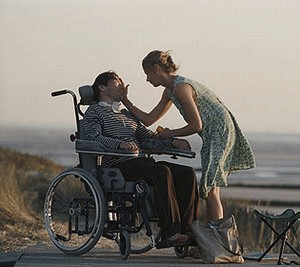 |
| Journalist Jean-Dominque Bauby describes what life is like after suffering a massive stroke in the book, The Diving Bell and the Butterfly. The film version will be screened on Monday, followed by a panel discussion featuring Shawn Jennings, who also suffered a brainstem stroke. |
After graduating from Dalhousie Medical School, Shawn Jennings spent an active 20 years as a successful family doctor. Then suddenly, one spring day in 1999, Dr. Jennings was suddenly unable to eat, speak to his family, or move anything but his eyes.
“I had a brainstem stroke,” says Dr. Jennings. “I was left ‘locked-in.’ That means everything in your body is paralyzed. You can’t talk. You can’t eat. You can’t move… (but) your brain knows everything.”
Dr. Jennings was 45. Since then he has been in slow, continuous recovery. “I’m able to eat now, I’m able to talk,” he says in a phone conversation. “I’m in a power wheelchair. I can move my left arm to eat… this happened 10 years ago. I may have stayed (totally) locked-in for about four months.” It was, however, two years before he could speak clearly enough to be understood.
While he fought to reclaim his body, Dr. Jennings also exercised his mind. “I started writing about a year after my stroke… I had read The Diving Bell and the Butterfly…” (Jean-Dominique Bauby’s memoir of locked-in syndrome, dictated one eyelash-flutter at a time.) “The nurse mentioned to me ‘you should write a memoir’ because she thought that my experience of being a doctor would be unique.”
The writing process was physically therapeutic, helping Dr. Jennings regain the use of his hand. However, his past in the medical field proved a challenge to more personal writing. “I had to stop writing like a doctor. That was a challenge, not to slip into medical lingo. I wanted to keep it in layman’s terms… writing a memoir, you write from your own experiences, in your own name.”
Dr. Jennings’ book, Locked In Locked Out, was published in 2002. Twice reprinted, it is now a textbook at the University of New Brunswick and at Queen’s University.
Shawn Jennings continues to write—when he can find the time. “I’ve been so busy with committees and my community; I don’t have a lot of time to write.”
Highly involved in volunteer activities, including the Stroke Network, Dr. Jennings also serves as president at the Canadian Association of Physicians with Disabilities and on New Brunswick’s Premier’s Council on the Status of Disabled Persons.
“During the mornings, that’s mostly dedicated to exercise… the afternoon, that’s mostly devoted to lots of work with committees. If I have a moment or two, I’ll write. And in the evenings, that’s my leisure time.”
Dr. Jennings regained a measure of mobility. But locked-in syndrome can be a life sentence. Not all patients can undergo even a limited recovery, and some will remain locked-in for the rest of their lives – especially traumatic given the lack of public awareness of the syndrome.
On Monday, March 16, Novel Tech Ethics will give a public screening of the recent film version of The Diving Bell and the Butterfly, with a panel discussion to follow.
Shawn Jennings has been asked to sit on the panel. “This is put on by (Novel Tech Ethics),” he explains, “And they want to reach the public… you know, I talk to many people, and I usually tell them my main message—talking about my turn to acceptance and finding happiness after a life-changing event. But this will be the first time, I imagine, they’ll be talking about the ethical questions surrounding the state of being locked-in. And so this is completely new for me.”
The Diving Bell and the Butterfly will be shown at 7 p.m. on Monday, March 16, at the Halifax Infirmary, QEII Royal Bank Theatre at 1796 Summer Street. Seating is limited.
